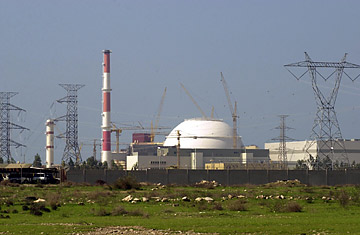
A nuclear power reactor in Bushehr, Iran. The diplomatic cables released by WikiLeaks reportedly show King Abdullah of Saudi Arabia urging the U.S. to attack Iran and destroy its nuclear program
Western powers are unlikely to find Iran in an accommodating mood when their envoys meet Tehran's nuclear negotiator on Sunday in Vienna. The first nuclear talks in more than a year between Iran and the major Western powers (plus Russia and China) coincide with a series of events that will have raised Iran's suspicions of and hostility toward the intentions of its Western interlocutors. A top Iranian nuclear scientist was murdered and a second seriously injured on Monday in two separate attacks in Tehran. The incidents follow a similar one in January that killed another top nuclear scientist. Then there was the Stuxnet computer worm implanted in the computer systems that run Iran's nuclear reactor at Bushehr and its uranium-enrichment plant at Natanz, which appears to have caused the mid-November temporary shutdown of the Natanz centrifuges that was reported last week by the IAEA. The covert war against Iran's nuclear program — assumed in Iran to be the work of either Israel or the U.S. — is clearly gaining momentum, and the track record suggests that Iran's response will be defiance. It would be prudent to assume that there are elements in Tehran right now lobbying the leadership to authorize covert acts of retaliation.
And then there are the WikiLeaks documents.
The revelation that some of the U.S.-aligned regimes in the region have urged Washington to bomb Iran's nuclear facilities probably didn't entirely surprise anyone in Tehran. Those same regimes have been arrayed against Tehran since the 1979 revolution, and they enthusiastically backed Saddam Hussein's eight-year war of aggression against Iran, which claimed hundreds of thousands of lives. But as Iran analyst Karim Sadjadpour wrote in the Financial Times on Wednesday, "Iran's strength lies primarily in its political influence, not its military prowess. Tehran's military budget is less than a quarter of regional rival Saudi Arabia's. But its soft power, along with it support for militias, can undermine governments with vastly superior armies, as has been evidenced by the U.S. in Iraq."
The pro-U.S. Arab regimes are deeply threatened by the political gains Iran has made, in no small part as a result of the U.S. invasions of Iraq and Afghanistan. But while they would dearly love to see Iran taken down a few pegs, they're also realistic. Israeli analyst Aluf Benn wrote on Wednesday that Arab leaders know the U.S. has little appetite for another war in the Middle East; the objective of their lobbying was to ensure a U.S. hard line that would prevent any grand-bargain-type rapprochement between Washington and Tehran. But having been exposed in urging hostilities against Iran, those regimes that live within Iran's reach will likely seek to mollify Tehran by publicly distancing themselves from calls for military action, and possibly by doing more to enable Iran to evade the impact of sanctions.
The more damaging effect of the WikiLeaks revelations, however, is the shadow of cynicism they cast over the Obama Administration's diplomatic "outreach" to Iran. The cables make clear that efforts to engage Iran have been premised on the belief that demonstrating a willingness to talk — or at least to politely inquire whether Iran was ready to surrender to Western demands — would build support among the unconvinced for more coercive measures to be implemented when Iran, inevitably, declined to play along. "The U.S. undertook its engagement strategy with Iran with the clear conviction that it would fail," notes Gary Sick, a former National Security Council Iran specialist now based at Columbia University. "According to the record, the Obama Administration was briefing allies almost from the start — and before Iran had even had a chance to respond to offers of engagement — that we expected this initiative to fail and that we were actively preparing the pressure track that would immediately follow. Iran could hardly have been unaware of all this, so the chance that they would respond favorably ... was essentially zero."
The WikiLeaks documents, in fact, demonstrate that the Obama Administration has maintained the broad strategy of the Bush Administration to persuade Iran through a carrot-and-stick approach to give up on enriching uranium — but the Obama team has pursued it with greater tactical agility. Hence, the Administration routinely touts its greatest Iran achievement as being the sanctions it has managed to put in place. Despite the pressure of sanctions, however, there's little sign that Iran will agree to give up on enriching uranium, as the U.S. is demanding. The right to such enrichment as part of an internationally monitored energy program, which Washington still hopes to pressure Iran into relinquishing even after it has satisfied the transparency requirements at the heart of the U.N. sanctions, is a rare point of consensus across Iran's fractured political spectrum. And of course, the Iranians will note that Obama has not called for a halt to the covert component of Bush's strategy, even if the complaints of the Arab regimes underscore his reluctance to take direct military action.
The talks that are set for Sunday were to focus on a fuel-swap deal for a Tehran research reactor as a confidence-building measure; thought it doesn't tackle the substantial dispute, such a deal would ostensibly improve the atmosphere for doing so. Tehran may press ahead with that deal in the hope that demonstrating a more open stance even amid the covert war would further divide the sanctions coalition. But it could just as easily decide to push back in light of recent events. In any event, the idea that the talks will build confidence between the two sides to attempt a more substantial agreement seems highly dubious.
